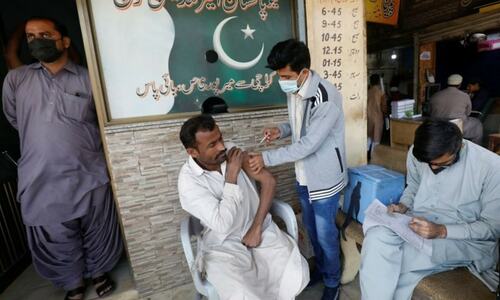As the fifth wave of the coronavirus intensifies in Pakistan, the positivity rate in the country's financial capital Karachi has doubled in one week to cross 10 per cent, it emerged on Friday.
Data from the Sindh health department showed that the positivity rate in Karachi was 4.74pc on December 31, 2021, when 160 people in the metropolis tested positive for the virus. In contrast, 650 people tested positive in the provincial capital on January 6, while the positivity rate was recorded at 10.25pc.
The positivity rate in Hyderabad stood at 1.24pc in the last 24 hours while it was 0.94pc for the rest of the province.
Overall, the country detected 1,293 new infections in the last 24 hours – highest in over three months – marking the second day of more than 1,000 daily cases. The highest number of cases was reported in Sindh at 759 followed by Punjab at 376.
In a statement, Abdul Rasheed Channa, spokesperson for the Sindh chief minister, said the total number of cases of the new variant had risen to 307 in the province.
Channa said under a separate initiative by the provincial government to gauge the prevalence of the Omicron variant, 37 samples were tested between January 3 and 5, out of which 30 came back positive for Omicron.
"Eighty-one per cent of samples tested in the last two days were positive for Omicron," he said.
Meanwhile, Karachi Administrator Murtaza Wahab urged citizens to wear masks and get vaccinated.
"Otherwise, very soon, the situation may go out of hand," he said on Twitter.
A day earlier, Sindh Health Minister Dr Azra Fazal Pechuho said a lockdown can be imposed after assessing the surge in cases of Omicron, which is showing a continuous rise.
She feared the pace at which the Omicron cases were rising showed they would further increase in the next couple of months.
She said a lockdown was not being imposed immediately, but could be enforced after assessing the situation in hospitals and cities, and called for implementing standard operating procedures (SOPs) for Covid-19 as defined earlier.
Pechuho said people with a history of foreign travel were being screened and advised all those who had been vaccinated six months ago to go for booster shots. "Covid-19 is here to stay, it has become part of life and it might become endemic in nature sometimes," she said.
The minister said the vaccination ratio among students of private schools was 80 to 90pc but figures for public sector schools were not encouraging. Parents were advised to get their children above 12 years of age vaccinated, she said.
Door-to-door vaccination
Meanwhile, the Sindh government, in a major move, decided to boost its vaccination campaign across the province with the help of lady health workers (LHWs), who would inoculate people in door-to-door visits, officials and sources said.
The decision to engage the LHWs came after a series of meetings and deliberations by the health department with experts and officials of different government institutions who were handling and supervising the vaccination drive in the province.














































